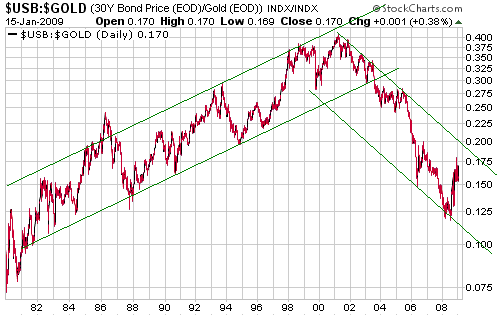|
|||
Loan defaults, deflation and bondsSteve Saville
Loan Defaults There seems to be a lot of confusion about how loan defaults affect the money supply, so we'll quickly cover some old ground. When a bank makes a loan by creating new currency, the money supply grows by the amount of the loan. If the bank's customer (the borrower) subsequently defaults, the money supply is not immediately affected because the money that was loaned remains within the economy (the borrower spent the money, so the money is now held by other people). However, when the borrower defaults the lending bank is forced to write off its investment and the resulting capital loss could mean that the bank in question will be less able or willing to make new loans. In other words, widespread defaulting on bank loans will not cause the total money supply to fall, but it can lead to slower money-supply growth in the future. Loan default does not directly affect the money supply, but loan repayment often does. For example, when a bank's customer repays a loan the money supply falls by the amount of the repayment. As a consequence, if a homeowner defaults on his/her mortgage obligation, prompting the associated lending bank to foreclose on the loan and to then sell the property, the money supply would be reduced by the proceeds of the foreclosure sale. In the US and many other countries a lot of people are in default on their home loans, causing banks to suffer large losses. It is reasonable, then, to conclude that banks will be less able or willing to make new loans in the future than they were in the past; so although the loan defaults will not directly cause the money supply to fall they could result in slower future monetary expansion. On the other hand, the government and the central bank will have a lot to say about whether or not the rate of money-supply growth actually ends up being slowed by the commercial banks' capital losses. This is because there is no limit to the amount of new money that the government, with the aid of the central bank, can borrow into existence. Consider, for example, the relative ease with which the US Federal Government has recently added trillions of dollars to its debt load. So far, the US Government has not only been able to offset the effects on the money supply of reduced bank lending, it has caused the rate of money-supply growth to accelerate (the year-over-year rates of TMS and M2 growth are now approaching 10%). Despite the assertions of the avid deflation forecasters it is therefore far from a foregone conclusion that private sector de-leveraging and the travails of the banking industry will result in genuine deflation. Treasury Bonds - in real terms The moon-shot in T-Bond futures during November-December of last year took this market well above its previous all-time high in nominal dollar terms, but the following chart shows that it's a very different story in gold terms. The chart shows that after rising for about 20 years within an upward-sloping channel, the TBond/gold ratio (the 30-year Treasury Bond in gold terms) reversed direction in 2001 and has since been mired in a downward sloping channel. When viewed in this way, last year's moon-shot in the T-Bond price looks like a rebound within a major bear market. There are good reasons to expect that the bond/gold bear market will persist for at least a few more years. Most importantly, the US Government and the Fed are working overtime to reduce the value of bonds relative to gold, and the US government's ability to increase the supply of bonds is boundless. Or, to put it more aptly, the US government will be able to churn out new bonds at whatever pace it deems necessary -- up to the point where the market becomes so concerned about inflation risk that the T-Bond price tanks. Moreover, wrong-headed Keynesian thinking dominates the world of economic policy-making, so schemes to 'reflate' the economy by rapidly increasing the government's indebtedness are likely to remain the order of the day.
Steve Saville Regular financial market forecasts and analyses are provided at our web site: We aren't offering a free trial subscription at this time, but free samples of our work (excerpts from our regular commentaries) can be viewed at: http://tsi-blog.com Saville Archives |

